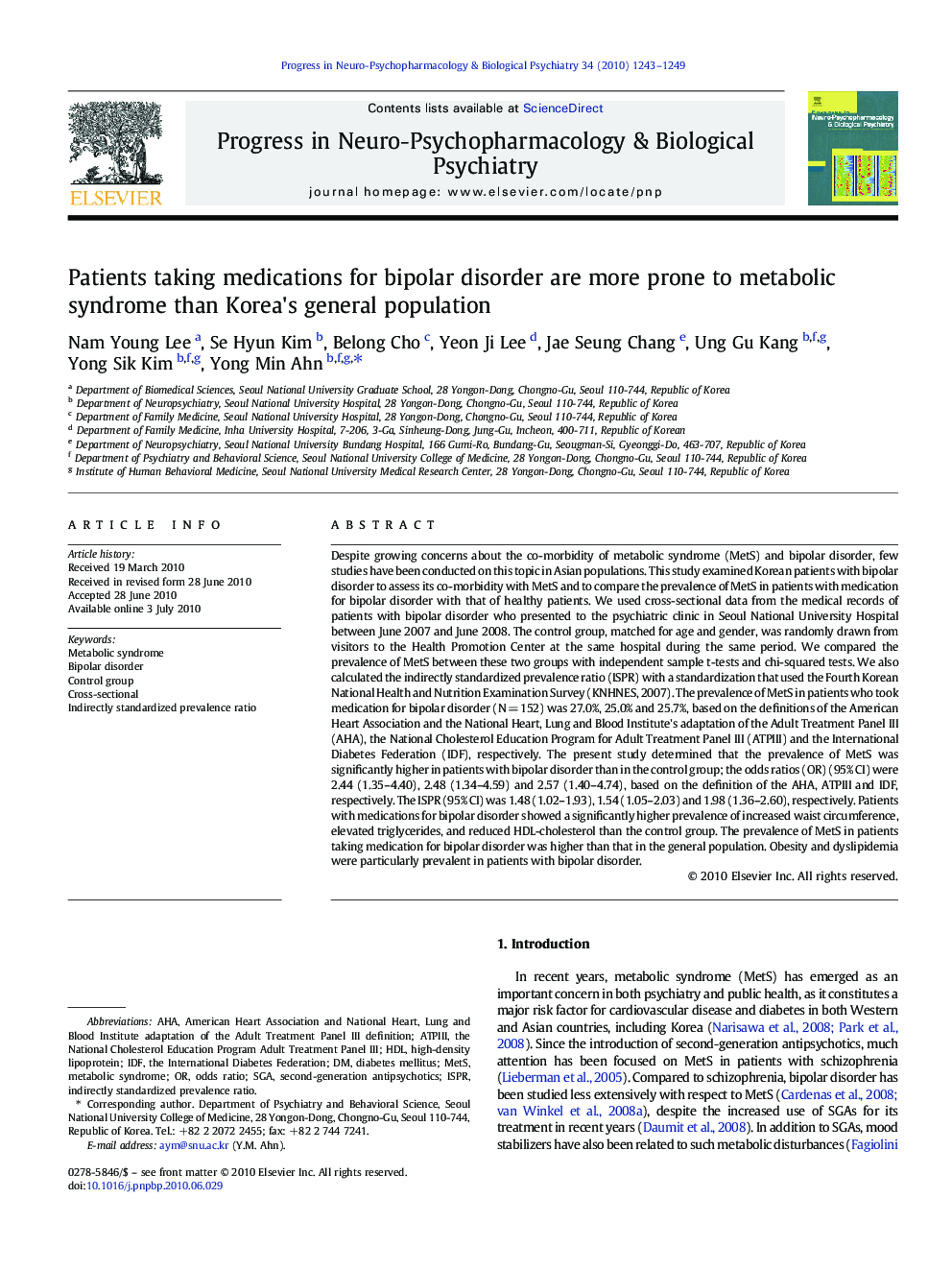| Article ID | Journal | Published Year | Pages | File Type |
|---|---|---|---|---|
| 2565495 | Progress in Neuro-Psychopharmacology and Biological Psychiatry | 2010 | 7 Pages |
Despite growing concerns about the co-morbidity of metabolic syndrome (MetS) and bipolar disorder, few studies have been conducted on this topic in Asian populations. This study examined Korean patients with bipolar disorder to assess its co-morbidity with MetS and to compare the prevalence of MetS in patients with medication for bipolar disorder with that of healthy patients. We used cross-sectional data from the medical records of patients with bipolar disorder who presented to the psychiatric clinic in Seoul National University Hospital between June 2007 and June 2008. The control group, matched for age and gender, was randomly drawn from visitors to the Health Promotion Center at the same hospital during the same period. We compared the prevalence of MetS between these two groups with independent sample t-tests and chi-squared tests. We also calculated the indirectly standardized prevalence ratio (ISPR) with a standardization that used the Fourth Korean National Health and Nutrition Examination Survey (KNHNES, 2007). The prevalence of MetS in patients who took medication for bipolar disorder (N = 152) was 27.0%, 25.0% and 25.7%, based on the definitions of the American Heart Association and the National Heart, Lung and Blood Institute's adaptation of the Adult Treatment Panel III (AHA), the National Cholesterol Education Program for Adult Treatment Panel III (ATPIII) and the International Diabetes Federation (IDF), respectively. The present study determined that the prevalence of MetS was significantly higher in patients with bipolar disorder than in the control group; the odds ratios (OR) (95% CI) were 2.44 (1.35–4.40), 2.48 (1.34–4.59) and 2.57 (1.40–4.74), based on the definition of the AHA, ATPIII and IDF, respectively. The ISPR (95% CI) was 1.48 (1.02–1.93), 1.54 (1.05–2.03) and 1.98 (1.36–2.60), respectively. Patients with medications for bipolar disorder showed a significantly higher prevalence of increased waist circumference, elevated triglycerides, and reduced HDL-cholesterol than the control group. The prevalence of MetS in patients taking medication for bipolar disorder was higher than that in the general population. Obesity and dyslipidemia were particularly prevalent in patients with bipolar disorder.
Research highlights►Metabolic syndrome has become a major concern in psychiatric field recently. It is well known that patients with schizophrenia are more prone to metabolic syndrome than general population. In respect to bipolar disorder, more than 15 studies about the prevalence of metabolic syndrome have been reported since 2005 and most of them have been conducted in western countries. In addition, the prevalence has been reported using various definitions of metabolic syndrome, which makes it difficult to compare each other. There are a lot of differences among the results according to region of study, i.e., US or Europe, implying that the prevalence of metabolic syndrome may be different according to region or ethnicity. In Asia, only two studies have been reported. One is conducted in Taiwan of East Asia and the other in Turkey of West Asia.►We have evaluated the prevalence of metabolic syndrome in patients taking medication for bipolar disorder using the three most commonly used definitions of metabolic syndrome in order to compare them with previous results. And we compared them with those of age and gender matched control group drawn from same hospital's Health Promotion Center and figured out standardized prevalence ratio (ISPR) using Korean National Health and Nutrition Examination Survey (KNHNES).►Despite some limitations of this study, such as cross-sectional chart review at one hospital, small sample size, etc., this was the first study to evaluate and compare the prevalence of metabolic syndrome in patients with medication for bipolar disorder and control groups using the three definitions of metabolic syndrome. Our major finding that patients with medication for bipolar disorder are more prone to metabolic syndrome in Korean population is the first of its kind to be reported.
